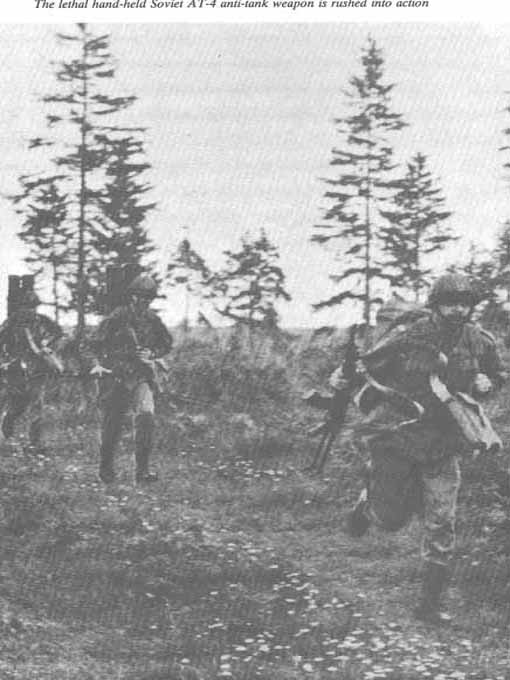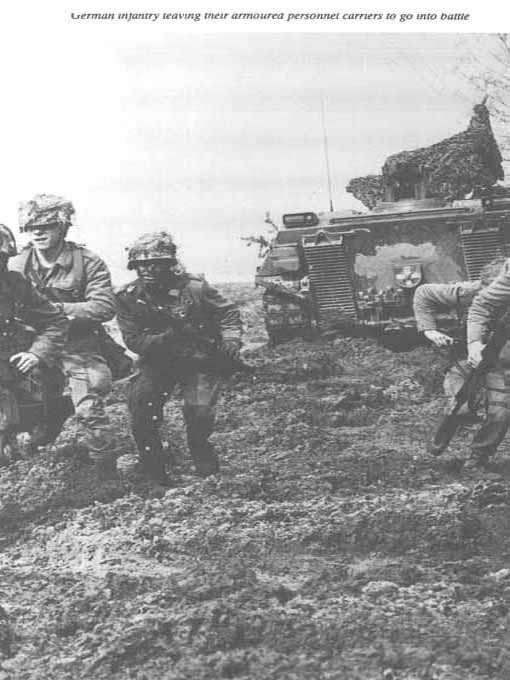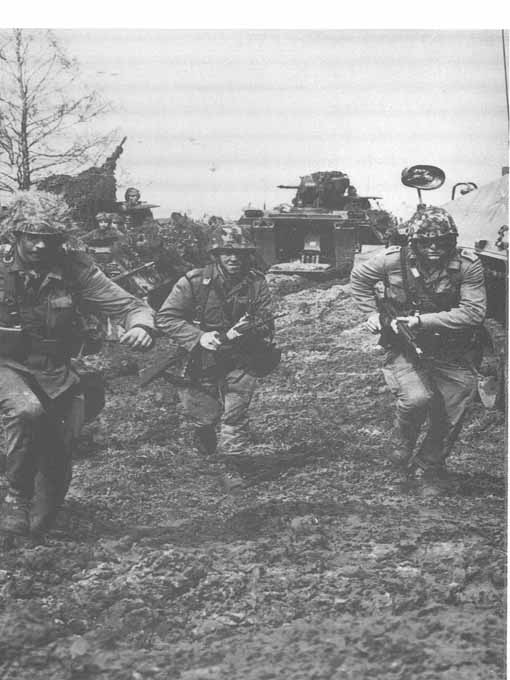The Third World War - The Untold Story (28 page)
Read The Third World War - The Untold Story Online
Authors: Sir John Hackett
Tags: #Alternative History

Two East German and two Soviet motor rifle divisions had now been taking turns pounding at one British division for several days. There would have been severe losses on the enemy’s side, but not as many as we have had, thought Nekrassov as he looked around at his own company. Only twenty-three dismounted men were left, plus six remaining BMP with their crews. But what was happening? The troops on the ground had gradually begun to drift away, slowly crawling to the rear.
“Back! Back!” shouted Senior Lieutenant Nekrassov. It was no use. They did not understand him. These were all Uzbeks or Kirghiz, with scarcely a word of Russian between them. Nekrassov had taught them what he could. They had all learnt the command “Advance”. Not “Withdraw”, naturally; there was no such order. They might misunderstand what he was saying now, and go on making for the rear instead of back to the battle. Those heavy multiple rocket launchers on the other side were enormously destructive and very frightening, that was sure. But this had to be stopped.
“Back to where you came from,” shouted Nekrassov, “not to the rear. The KGB will shoot you!”
The soldiers who were creeping back stopped and looked towards their commander. Still keeping close to the ground, he pointed to where No. 2 Company, also drifting back, was coming under the machine-gun fire of the KGB barrage battalion, whose function at the rear was to ensure, by any means, that the forward momentum of their own troops was maintained. The Uzbeks understood and took cover. They turned and grinned at Nekrassov. Their expression clearly said: “Thanks, Sir! You told us just in time!” But only their eyes said this. They had never been taught enough to be able to say it in Russian.

It was late evening before the ammunition arrived. In some ways its arrival was welcome, in some ways not. It is impossible to manage without ammunition in a war, that’s certain, but now they’d be sent in to attack again. Who would survive this time?
Along with the ammunition came meagre rations for lunch and supper rolled into one as well as the next morning’s breakfast. There was vodka for 105 men, very little bread and only ten jars of meat paste. Nekrassov cursed the supply services in a rage.
“Comrade Senior Lieutenant,” explained the stout Sergeant Major, Astap Beda, doing his best to calm things down, “the regimental doctor says it’s dangerous to eat a lot during a battle. What if you are wounded, and have to be operated on with a full stomach?”
“That man’s a lickspittle liar!” burst out Nekrassov. “They’ve no bread, they can’t feed the troops, so with the help of the medics they dream up bogus scientific theories.” Then he stopped himself.”


The Warsaw Pact offensive opened with considerable advantage to the attack. The ratio of forces gave them a general superiority over their opponents of rather better than three to one in ground troops, with an even more marked numerical advantage in tanks and tube artillery, though with no great advantage in quality. Indeed the latest generation of NATO tanks, the US M-1
Abrams,
the German
Leopard
II and the British
Challenger,
which represented an improvement even on the formidable
Chieftain
(though this still formed the core of the British tank fleet) were every bit as good as the T-72s which constituted the main Soviet tank armament, and even had the edge on the T-80s, of which some but not very many were already in service with Soviet troops in 1985. Allied ATGW were fully as efficient as those of their opponents, though their air defence weaponry was less so.
In their tactical air forces, as in target acquisition and battlefield control techniques, the Western allies had had to accept disappointment in the pre-war years, when budgetary restrictions deprived them of much needed innovations. They had largely had to make do with what there was, but with a deliberate attempt to do so more effectively, exploiting to the full such improvements as tight budgets permitted.
The Warsaw Pact side also enjoyed the advantage on 4 August 1985 of having had, roughly speaking, about two weeks’ more time in which to mobilize than NATO.
A further advantage to the offensive lay in the initiative over nuclear and chemical weapons. It was clear that biological weapons would not be used, but operations on the Western side had to be conducted in initial uncertainty over the other two. This meant accepting the penalty of operating under nuclear and chemical precautions with a degradation of efficiency which in some situations could be something like 50 per cent.
The greatest advantage of all to the offensive, however, lay in the choice of time and place for attack, which put in the attackers’ hands the power to concentrate a high superiority of force almost where they wished.
In fact, topography exercised so compulsive an influence on choice of thrust line that Soviet hands were not as free as in theory they should have been, while Allied formations were fighting on ground they now knew very well indeed, which the enemy did not. None the less the speedy identification of main thrusts, so that defences and counter-offensive means could be moved to meet mounting threats in good time, formed one of the main preoccupations of Allied corps and divisional commanders.
A message that came out from Supreme Headquarters Allied Powers Europe (SHAPE) to the world at large on 4 August 1985 read as follows:
‘Warsaw Pact attacks Allied Command Europe. First light undercover and parachute operations followed by massive armoured assault along entire front. Heavy fighting in Central Region. Allies under severe pressure. Soviets claim action “purely defensive”. Situation confused. MFL.’
There was, indeed, scarcely any part of the forward positions of NATO in the Central Region which in the early hours of that August day of 1985 did not come under violent air and artillery attack, with chemical weapons freely in use.
The position in NATO over chemical warfare (CW) was far from satisfactory. Up to the very moment of the outbreak European allies had not been able to reach general agreement on the acceptance of chemical munitions to be located in their own countries in peacetime. The US, as we have seen earlier in Chapter 5 on weapons, had been manufacturing binary rounds since the early 1980s and under bilateral agreements with the UK and the FRG producing stocks also for them, to be held on their account in the United States until needed. The UK took in some of the stock held on their behalf in air shipments from the United States starting on 1 August and were ready to retaliate on 6 August. The FRG followed suit two days later. Typically, there was on 4 August still no decision in the NATO Council. The Supreme Allied Commander, as Commander-in-Chief of all US troops in Europe, would not wait. In that capacity, with the approval of the Joint Chiefs of Staff in Washington, he ordered immediate retaliation by US troops on 4 August. The I British Corps opened retaliatory action on 6 August, the three German corps on 8 August.
Other allies had no such capability. There was no great difficulty in furnishing them fairly soon, however, with compatible binary round artillery munitions and in lending 2 Allied Tactical Air Force (ATAF) a squadron of F-4s fitted with spray tanks, with which to reply. Warsaw Pact protective equipment was less effective than that on the Western side and chemical casualties were proportionately higher for the same weight of attack. After 8 August chemical attack on ground troops dwindled everywhere, though it continued on airfields where, with the additional use of delayed-action bombs, there was sometimes a serious lengthening in turn-round times of aircraft as a result.
On 11 August 1985 Mr and Mrs George Illingworth of Bradford, Yorkshire, received a letter from their eldest son Brian, a senior aircraftsman instrument mechanic serving with the RAF at Bruggen in West Germany when war broke out. It ran as follows.
“Dear Mum and Dad,
I will tell you straightaway that I am all right except for a broken leg and cuts and bruises. That’s because you will see that this was written from the RAF Hospital at Wroughton. The Doc says I can write and tell you how I got it and I suppose he knows all about secrets and all that stuff.
Me and the lads were on early shift down the HAS [hardened aircraft shelter] with the Squadron. You remember I moved over to 17 a month ago. I say early shift but that’s not really right because we had all been called up on the base the previous day. There was a lot of talk about the war starting and we had listened in to Forces Broadcasting but we thought it might be just a gimmick by the TACEVAL blokes (you remember Mum, those exercises when we had to wear our noddy suits for hours and play at soldiers), because they were always clever at kidding on that the exercises were for real. Anyway we got a talk from the CO - he’s a bit strict but he’s not bad - and then we got another one from the Squadron Commander who didn’t seem to know whether he wanted a DFC or to go home to Mum. And we were told that this time it was for real and that the Tornado Wing at Bruggen would be a No. 1 target for old Ivan.
We’d practised a lot for the real thing. We knew that Ivan might attack with ordinary bombs, gas or even nukes, so at midnight when the siren sounded it didn’t take long for all of us to get kitted up in the noddy suits. I couldn’t understand why we simply sat back and waited if we knew Ivan was going to hit us. I’ll bet the Israelis wouldn’t have. It was something to do with the “* * * ing politicians”, according to our Sergeant (sorry, Mum, but he does f and blind it a bit). Anyway, sure enough at half past six the tannoy hollered “RED - RED - RED” which meant that we were about to get attacked. Most of the big iron doors on the HAS were already shut and those that weren’t quickly were, all except ours. You wouldn’t believe how many times we’d practised and never once had it jammed. You can close them by hand but it takes more time than we thought we’d got. So there we were, with a four-foot gap right in front of our two Tornados.
Luckily, as it turned out, our HAS faced south. Because about seven minutes after the warning there was a thundering roar and at least sixteen, or so some of the other lads said, Soviet bombers came over the airfield. I could only see two or three through the gap in the door as they flashed past over the runway. We thought they might attack with gas but, this time at least, they didn’t. It all seemed to have been ordinary bombs. There was an enormous bang on the roof of our HAS and a shower of paint and muck came down but the concrete didn’t even crack. Just as quickly as they’d appeared they’d gone again and Corp and me and the other lads rushed out to see what had happened. We were a bit daft really, and Sarg didn’t half tell us so too, because of course Ivan could have come round for a second go. But in fact he didn’t and for a minute or two we just stood and stared at the mess he’d left.
Over to our right the central servicing hangars were on fire - a right old mess, with smoke everywhere. The air traffic control block was badly damaged and so were several of the barrack blocks and SHQ. Some of the fuel bowsers were in flames and a bulldozer belonging to the runway repair engineers was on its side and very bent. Black smoke began to pour across the airfield from one of the other Squadron dispersals and I heard here in hospital that one of the Squadron areas had really been hammered - all the bowsers and one shelter had been hit. Most of us though, to begin with at least, had been lucky, because we’d been in the HAS with the aircraft and I don’t think any of them were damaged. Some of the rockapes (that’s what we call the RAF Regiment lads) and some of the cooks on guard duty got caught out in the open nearer the perimeter wire and one of them’s in the next bed. He says that he lost a lot of mates even though most were in slit trenches.
